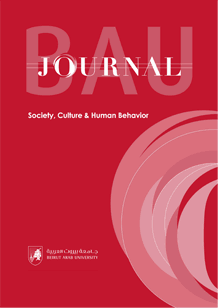Respected Academics and Readers,
With great pleasure, I welcome you to the Journal of Society, Culture, and Human Behavior, published by the Beirut Arab University Press. This publication provides a forum for academics, researchers, and readers to interact with interdisciplinary research across a vast array of specialties.
With it aims to provide high-caliber knowledge to the academic literature and serve as the cognitive hub of our community, the Journal focuses on BAU's research issues in the areas of Society, Culture, and Human Behavior. Whilst we look forward to receiving creative research for future volumes, I encourage you to peruse it I thank everyone who has contributed to its fulfillment.
Warm regards, Editor-in-Chief Prof. SiddeekavLasheen Dean, Faculty of Human Sciences, Beirut Arab University, Lebanon
Current Issue: Volume 5, Issue 2 (2024)
Najat Saliba Aoun, Professeur – Membre au Parlement Libanais
Climate Change and Greenhouse Gases
Climate change is driven by the accumulation of greenhouse gases (GHGs) in the Earth's atmosphere. These gases, primarily carbon dioxide (CO₂), methane (CH₄), and nitrous oxide (N₂O), trap heat from the sun, creating a "greenhouse effect" that warms the planet.
Industrial Activities and GHG Emissions
Over the past two centuries, industrial activities have significantly increased the concentration of GHGs in the atmosphere. The burning of fossil fuels for energy, deforestation, and industrial processes are the primary sources of these emissions. Since the Industrial Revolution, human activities have increased atmospheric CO₂ levels from about 280 parts per million (ppm) to over 410 ppm today.
Global Warming
The term "global warming" refers to the rise in Earth's average surface temperature due to the increased concentration of greenhouse gases. This warming disrupts weather patterns, causes more extreme weather events, and affects natural ecosystems. Global warming is a key driver of climate change, which encompasses a broader range of changes, including shifts in precipitation patterns, ocean currents, and increased frequency and severity of extreme weather events.
The Troposphere
The troposphere is the lowest layer of Earth's atmosphere, extending from the surface to about 10-12 kilometers (6-7.5 miles) high. This is where most weather occurs and where the majority of life-sustaining processes take place. The troposphere contains approximately 75% of the atmosphere's mass and nearly all of its water vapor and aerosols.
Impact of GHG Accumulation
The accumulation of greenhouse gases in the troposphere creates several challenges for life on Earth. Increased GHG levels lead to higher global temperatures, which in turn cause a cascade of environmental impacts:
- Temperature Rise: Higher temperatures can lead to heatwaves, droughts, and longer growing seasons in some regions. These changes can disrupt ecosystems and agricultural productivity.
- Water Quality: Warmer temperatures can affect water quality by promoting the growth of harmful algal blooms, reducing oxygen levels in water bodies, and altering the distribution of aquatic species. Melting glaciers and ice caps also contribute to rising sea levels, which can lead to saltwater intrusion into freshwater systems.
- Air Quality: Increased temperatures can exacerbate air pollution problems by enhancing the formation of ground-level ozone and other pollutants. Poor air quality has significant health impacts, particularly for respiratory and cardiovascular conditions.
- Disease Spread: Climate change influences the spread of diseases by altering the habitats and behaviors of vectors like mosquitoes and ticks. Warmer temperatures and changes in precipitation patterns can expand the range of vector-borne diseases such as malaria, dengue fever, and Lyme disease.
Lebanon's Contribution to Localized Pollution
While Lebanon is not an industrial powerhouse and does not contribute substantially to the global carbon footprint, it faces significant environmental challenges due to localized pollution. The country's heavy reliance on diesel generators for electricity, coupled with lax enforcement of emission regulations, has led to a severe degradation of air quality.
Diesel Generators and Air Pollution
In Lebanon, frequent power outages have made diesel generators a common solution for electricity supply. These generators emit a substantial amount of pollutants, including soot particles (black carbon), nitrogen dioxide (NO₂), and carbon dioxide (CO₂).
- Soot Particles (Black Carbon): Diesel generators release fine particulate matter, commonly known as soot or black carbon. These particles can penetrate deep into the lungs, causing respiratory and cardiovascular diseases. Black carbon also has a strong warming effect on the atmosphere, contributing to the local rise in temperatures.
- Nitrogen Dioxide (NO₂): NO₂ is a harmful pollutant that can irritate the respiratory system and reduce lung function. It also contributes to the formation of ground-level ozone, a major component of smog, which further exacerbates air quality issues.
- Carbon Dioxide (CO₂): Although Lebanon's overall CO₂ emissions are relatively low compared to industrialized nations, the local concentration of this greenhouse gas can still contribute to the warming of the microenvironment. Increased CO₂ levels enhance the greenhouse effect, trapping more heat and raising local temperatures.
Microenvironmental Impacts
The heavy use of diesel generators and the resulting emissions create a microenvironment where temperatures are higher than they would be otherwise. This localized warming can have several adverse effects:
- Urban Heat Islands: The concentration of emissions in urban areas can lead to the development of urban heat islands, where cities experience higher temperatures than surrounding rural areas. This can increase energy demand for cooling, create heat stress for residents, and exacerbate health problems.
- Health Implications: The poor air quality resulting from high levels of soot and NO₂ has serious health implications for the population. Increased respiratory and cardiovascular diseases, along with a higher incidence of asthma and other chronic conditions, place a burden on the healthcare system.
- Environmental Degradation: The combination of air pollution and higher temperatures can stress local ecosystems. Plants and animals may struggle to adapt to the changing conditions, leading to reduced biodiversity and ecosystem resilience.
Need for Regulation and Sustainable Solutions
Addressing these challenges requires effective regulatory frameworks and the enforcement of emission standards. Transitioning to cleaner energy sources, such as solar or wind power, can significantly reduce reliance on diesel generators and improve air quality. Additionally, raising public awareness and encouraging sustainable practices can help mitigate the local environmental impact and contribute to global efforts to combat climate change.
Conclusion
The accumulation of greenhouse gases due to industrial activities over the past two centuries has set in motion a series of environmental changes that challenge life on Earth. Addressing climate change requires urgent and sustained efforts to reduce GHG emissions, transition to renewable energy sources, and adapt to the changes already underway. Effective action can mitigate the most severe impacts and help ensure a more sustainable and resilient future for all. While Lebanon's global carbon footprint may be small, addressing local pollution through regulatory enforcement and sustainable energy solutions is crucial for improving public health and environmental quality.
Articles
CLIMATE CHANGE AND ITS EFFECT ON THE ACTION OF THE ARTICAL CHARACTERS “SELECTED SAMPLES FROM INTERNATIONAL PLAYS
Siddeeka Lasheen
" التحول المناخى وأثره على فعل الشخصيات المسرحيةنماذج مختارة من مسرحيات عالمية
Article Language: Arabic
BETWEEN THE IMAGINATION OF LEGENDS AND THE CHALLENGE OF REALITY: WRITING TO SAVE THE PLANET
Nadia Iskandarani
Entre l’imaginaire des légendes et l’enjeu du réel : Écrire pour sauver la planète
Article Language: French
CLIMATE CHANGE AND NEOLOGISMS: TOWARDS A LEXICO-SEMANTIC STUDY
Abdelfetah Nacer Idrissi
Changement climatique et néologismes : vers une étude léxico-sémantique
تغير المناخ والمصطلحات الجديدة: نحو دراسة معجمية دلالية
Article Language: French
WORLD WITHOUT END: THE ALLIANCE OF SCIENCE, FICTION, AND IMAGES IN WARNING OF GLOBAL WARMING
Soumaya Al Jarrah
Le Monde sans fin : l’alliance de la science, de la fiction et de l’image face au réchauffement climatique
Article Language: French
“A NEW WORLD AND A NEW SOCIETY CHALLENGED BY A PROBLEMATIC CHARACTER IN LA COMPAGNIE DES GLACES BY G.J. ARNAUD”
Sophie Nicolaïdès Salloum
Un monde nouveau et une société nouvelle contestés par un personnage problématique dans La Compagnie des glaces de G.J. Arnaud
Article Language: French
Changement climatique et ordre nouveau dans La Compagnie des glaces de G.J. Arnaud : novum et monde alternatif ou référence au réel ?
Article Language: French
OF ECOLOGICAL IDENTITY IN LITERATURE HUMUS BY GASPARD KOENIG
Christelle Stephan Hayek
De l’identité écologique en littérature : Humus de Gaspard Koenig
Article Language: French
CLIMATE AND CATASTROPHE IN "THE SHIPWRECKED OF THE DELUGE" BY CHRISTIAN LABORI
Mireille El Hajjar
Anticipations des catastrophes climatiques dans Les Naufragés du Déluge de Christian Labori
Article Language: French
CLIMATE CHANGE CRISIS AND MENTAL HEALTH: A COMPREHENSIVE REVIEW AND FUTURE DIRECTIONS
Faten Iskafi
أزمة تغير المناخ والصحة العقلية: مراجعة شاملة وتوجهات مستقبلية
Article Language: Arabic
IMPACT OF GLOBAL WARMING ON THE MENTAL HEALTH AND SOCIAL ASPECT OF HUMAN BEINGS.
Emilie Chammas Fiani
Impact mental et social du réchauffement climatique sur la santé
Article Language: French
Son d'alarme chez Marguerite yourcenar dans Souvenirs pieux
Article Language: French
CLIMATE CHANGE AND ITS IMPACT ON HERITAGE
Mohamad Ali Al-Kouzi
التغير المناخي وأثره في التراث
Article Language: Arabic
CLIMATE CHANGE AND ITS IMPACT ON MIGRATION
Rama Aziz Darraz
التغير المناخي وأثره في الهجرة
Article Language: Arabic
RECONNEXION WITH NATURE AND SOLIDARITY, TWO MAJOR KEYS IN THE FIGHT AGAINST CLIMATE CATACLYSM IN C’EST LE MONDE A L’ENVERS BY NICOLAS VANIER
Hanane Abou Nasser Eddine
La reconnexion à la nature et la solidarité : clés majeurs pour lutter contre le cataclysme dans C’est le monde à l’envers de Nicolas Vanier
Article Language: French
THE ROLE OF CLIMATE SECURITY CONTENT ON INSTAGRAM IN CHANGING THE LIFESTYLE OF LEBANESE SOCIETY
Mariam Mohamad Hussein
دور محتوى الأمن المناخي على الإنستغرام في تغيير أسلوب حياة المجتمع اللبناني
Article Language: Arabic
NATURE FEARS EMPTINESS : AN ANALYTICAL READING OF EMOTIONAL EMPTINESS
Mariange Merhi
La nature a horreur du vide : lecture analytique du vide émotionnel
الطبيعة تهاب الفراغ : قراءة تحليلية للفراغ الوجداني
Article Language: French
THE IMPACT OF COLD WEATHER ON MOOD AND COGNITIVE STYLES AMONG A SAMPLE OF RESIDENTS OF THE COASTAL AREA OF TRIPOLI
Wissal Halabi
تأثير برودة الطقس في أساليب التفكير (الايجابي/ السلبي) والحالة المزاجية في محافظة الشمال
Article Language: Arabic
CLIMATE CHANGES AND THEIR PSYCHOLOGICAL AND SOCIAL REPERCUSSIONS AMONG A SAMPLE OF RESIDENTS OF AKKAR GOVERNORATE
Layal Al Rifai
التغييرات المناخية وتداعياتها النفسية والاجتماعية لدى عينة من سكان محافظة عكار
Article Language: Arabic
Regards croisés sur la tragédie de Katrina et sur ses impacts socio-écologiques dans Ouragan de Laurent Gaudé
الإنسان أمام طبيعة قوية ومدمِّرة: نحو تصوّر جديد للبيئة في “Ouragan” للوران غودي
Article Language: French
ART AND CLIMATE : A CREATIVE AWARENESS
Michel Abou Khalil
Art et climat : une prise de conscience créative
Article Language: French


